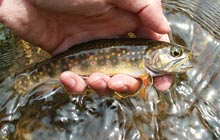The brook trout, aka the speckled trout or “brookie,” is dwindling. Speaking at a recent summit devoted to protecting the endangered game fish, Bryan Moore of Trout Unlimited called the brook trout “emblematic of Southern Appalachia,” citing both its cultural and ecological significance. And since the brook trout is particularly sensitive to changes in water quality and temperature, it’s also considered to be an indicator species whose health reflects that of the whole aquatic ecosystem and, by extension, the watershed that feeds it.

But threats such as habitat loss, logging, sediment in streams, competition from non-native species, climate change, hemlock loss and agricultural runoff have combined to put the brookie at serious risk. The colorfully speckled fish are now found in only 20 percent of their original habitat range, and they’ve been completely wiped out in 40 percent of North Carolina’s subwatersheds, according to the Eastern Brook Trout Joint Venture, a national conservation program.
The key to restoring brook-trout populations may lie in an unlikely partnership. Building bridges between conservation groups and private landowners such as real-estate developers was a central theme of the Oct. 23 summit, organized by the Southern Appalachian Biodiversity Project. The event brought private landowners, developers, environmental regulatory agencies and conservation groups to the table to explore options for working together to protect trout streams and other crucial wildlife habitat. Brookies found on protected public lands tend to be in far better shape than those in areas more impacted by development, according to biologist Ben Prater of the biodiversity project. Yet as Prater notes, “Wildlife don’t see boundaries.” And whether a given property is public or private, if it’s sold, trout habitat is always at stake.
The fish might not be the only ones to benefit from conservation efforts on private lands. Fred Grogan of Equinox Environmental, who gave a presentation during the summit, noted that developers taking advantage of the “growing awareness market for green development” can actually benefit financially from making environmental choices. Placing a conservation easement on undeveloped parcels within a subdivision, for instance, can lower a developer’s infrastructure costs and yield a higher premium for the project’s “green” status, according to Grogan. When his consulting firm guides a developer in sustainable design practices, says Grogan, biologists are sent onto the property to assess the ecology there long before groundbreaking. “They tell us where not to go,” he explains. Staying far away from trout streams and rare plant and wildlife habitat is a key component of sustainable design, he notes, adding that clients often appreciate that consideration of natural systems.
A 5,600-acre resort development in Watauga County, for instance, included 2,700 acres set aside for a permanent conservation easement. Boone-based developer Ginn Laurelmor partnered with the Blue Ridge Rural Land Trust to secure the easement, which brought the land trust some heat from the conservation community for partnering with a big developer. Nonetheless, both parties called the partnership a success. “By creating a conservation easement,” noted one developer who attended the summit, “you get a financial refund and an amenity that you can sell.”
It goes both ways, Prater observed during a discussion about conservation easements. “It’s not just whether developers are ready for easements. It’s also whether conservation land trusts are ready for developers.”
The conference also covered incentive programs for private landowners and small farmers who want to ensure that the streams running through their property remain hospitable to brook trout. The U.S. Department of Agriculture’s National Resource Conservation Service, for example, works with property owners to help them achieve conservation goals.
One aim of the summit, added Prater, was to gauge interest in a green certification program that would reward builders who set aside unspoiled tracts of property to protect trout streams. Green building is becoming increasingly popular in Western North Carolina, but current certification programs focus primarily on energy-efficiency measures and the use of green-building products. Some at the summit envisioned a new certification program—along the lines of the statewide HealthyBuilt Homes initiative or the national Leadership in Energy and Environmental Design—that could create an incentive to integrate habitat conservation into site design.
By the end of the conference, one thing was clear: Unless new alliances are forged to protect trout streams, the brookie will continue to struggle.



Before you comment
The comments section is here to provide a platform for civil dialogue on the issues we face together as a local community. Xpress is committed to offering this platform for all voices, but when the tone of the discussion gets nasty or strays off topic, we believe many people choose not to participate. Xpress editors are determined to moderate comments to ensure a constructive interchange is maintained. All comments judged not to be in keeping with the spirit of civil discourse will be removed and repeat violators will be banned. See here for our terms of service. Thank you for being part of this effort to promote respectful discussion.